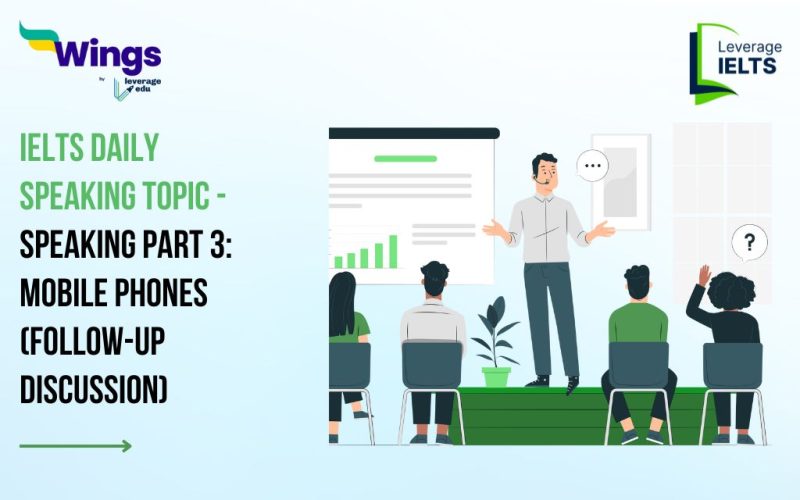Discussion Topics
- Mobile phones and Education
- Health and Safety Concerns
- Impact on social interaction
Follow-up questions
1. Mobile phones and Education
Q.1. How have mobile phones transformed the way students learn in the classroom?
Ans: Mobile phones have changed the learning process of students in numerous ways. For instance, students can now access a wealth of information at their fingertips. Students no longer rely on textbooks or library resources. They can now conduct online research, watch educational videos and even participate in interactive quizzes. Moreover, mobile phones have facilitated collaborative learning. For example, apps like Google Classroom allow students to work together on projects, and share their work and feedback. Take for example a history lesson where previously students used to read textbooks. Now they can watch documentaries, and engage with interactive timelines on their mobile phones.
Q.2. Can mobile phones help in making education more accessible to everyone? How?
Ans: Absolutely, mobile phones have played a significant role in making education accessible to people all around the globe. With just a smartphone and some internet, you can tap into a world of education with access to online courses, educational apps and e-books. For example, platforms like Khan Academy and Coursera offer a variety of courses that can be taken by anyone, anywhere all around the world. This is especially awesome for students in far-flung areas where good schools are hard to find. In addition to this, mobile phones have also led to more inclusive education. Whether you’re visually impaired or struggle with learning, there’s an app for that. Text-to-speech features help those who can’t see, while pictures make things clearer for others.
2. Health and Safety Concerns
Q.1 What are some health risks associated with prolonged use of mobile phones?
Ans: Excessive use of mobile phones poses several health risks. One significant concern is the potential exposure to radiation emitted by mobile phones. Ongoing studies suggest a possible link between heavy mobile phone use and certain types of brain tumours. Additionally, prolonged screen time can lead to digital eye strain, a common issue caused by staring at screens for extended periods without breaks. I’ve personally experienced this; after long stretches of work on my phone, my eyes feel incredibly fatigued. It’s a reminder to take regular breaks and practice healthy screen habits to minimize these risks.
Q.2. Are there any specific safety features you would like to see in future mobile phones?
Ans: The features I’d love to see in future mobile phones are robust parental controls. While some phones already offer some level of control, there’s always room for improvement. For instance, having features that allow parents to limit screen time, block specific apps, or monitor their child’s activity would be incredibly beneficial. Another aspect I’m keen on is enhancing data security and privacy protection. Since I store a lot of personal information on my mobile, I’d greatly appreciate it if future phones could provide robust data encryption, biometric authentication, and top-notch anti-malware systems to keep my data safe and secure.
Q.1. How have mobile phones changed the way we communicate and interact with each other?
Ans: Mobile phones have revolutionized the way we communicate in today’s world. They’ve made communication accessible to everyone, no matter where we are. For instance, I can easily send a message to my cousin in Canada, and within seconds, I receive a reply. This has made it incredibly convenient for me to stay in touch with loved ones, even when we’re miles apart. Moreover, mobile phones have transformed the way we consume and share information. With various social media platforms, news apps, and digital services, staying informed and sharing our thoughts has never been easier. For instance, while I may not read traditional newspapers much, I do follow several news agencies online to keep up with global events. Mobile phones have truly changed the game when it comes to communication and accessing information.
Ans: The use of mobile phones has undeniably transformed our social interactions and etiquette. Speaking from my own experience, they’ve made it easier for me to stay connected with friends and family, no matter where they are. I can quickly send a message or make a call, enhancing communication and fostering relationships. However, I’ve also noticed some challenges arising from smartphone use. For instance, I’ve become more accustomed to texting or messaging rather than engaging in face-to-face conversations. While I feel comfortable expressing myself through text, I sometimes struggle with in-person communication, feeling shy or hesitant to initiate conversations. This reliance on digital communication has been limiting my ability to connect deeply with others and develop strong interpersonal skills. Additionally, I’ve observed that the convenience of texting can sometimes lead to misinterpretations or misunderstandings, as nuances such as tone of voice and body language are lost in written messages. Owing to these experiences, I find smartphones negatively affecting our social interactions.
Are you preparing for IELTS? Check out this video to improve your speaking skills for the IELTS exam given below👇.
Download the Leverage IELTS App today.


Need help to prepare for IELTS? Check out the best IELTS preparation courses in the market offered in a live training environment by trusted educators in a live training environment. If you want help studying abroad, call 1800-572-130.
 One app for all your study abroad needs
One app for all your study abroad needs















 45,000+ students realised their study abroad dream with us. Take the first step today.
45,000+ students realised their study abroad dream with us. Take the first step today.